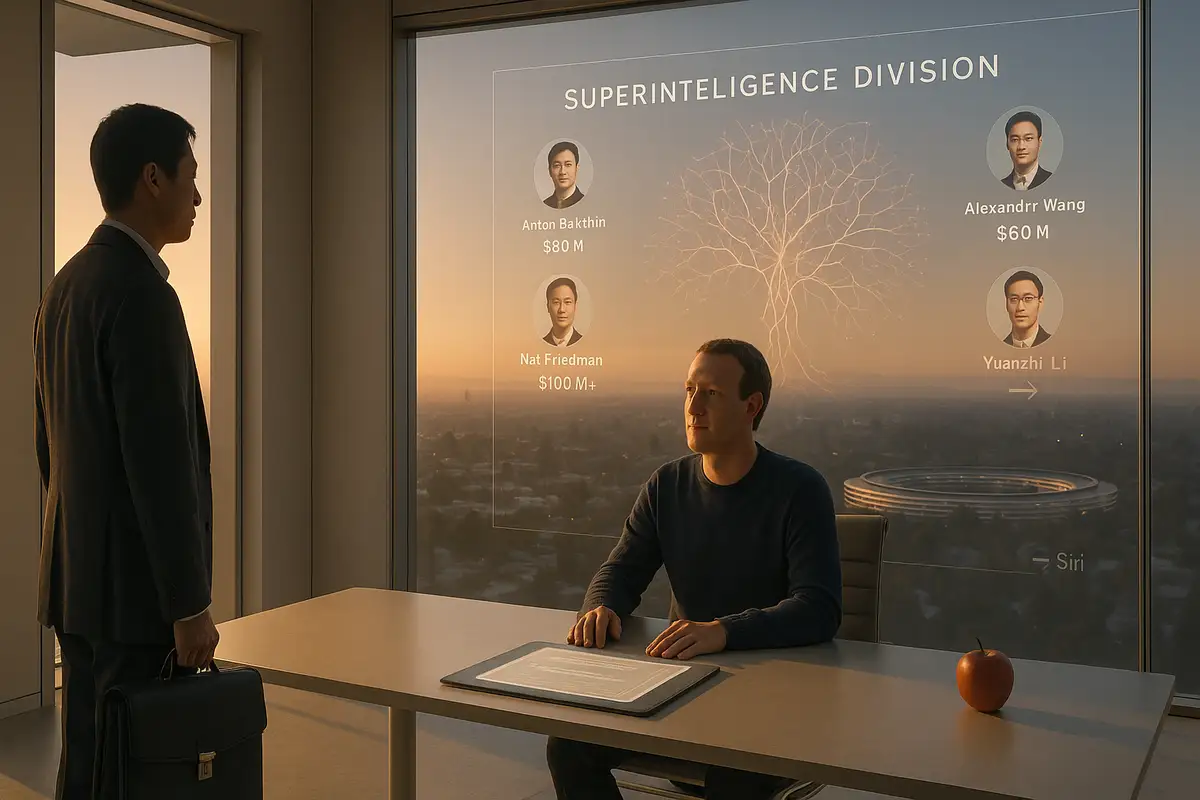💡 TL;DR - The 30 Seconds Version
👉 Meta copied Chinese startup DeepSeek's AI techniques for Llama 4, but developers found it harder to use than Llama 3 and mostly stuck with the older model.
📊 Zuckerberg responded by investing $14.3 billion in Scale AI and poaching researchers from OpenAI with compensation packages reportedly reaching $100 million.
🏭 Meta reports Q2 earnings Wednesday showing its slowest profit growth in two years at 11.5%, while operating costs jumped 9% from AI investments.
🌍 The company now questions its open-source strategy and may skip releasing the promised "Behemoth" version of Llama 4 for proprietary models instead.
🚀 Meta's stock is up 20% this year as investors bet on AI, but pressure mounts to show returns from billions in spending while growth slows.
Meta tried to pull off the ultimate Silicon Valley move: steal a competitor's playbook and do it better. Instead, the company face-planted so hard that CEO Mark Zuckerberg is now throwing billions at the problem.
The social media company's attempt to copy Chinese AI lab DeepSeek's techniques resulted in a Llama 4 model that disappointed developers so thoroughly that Meta had to overhaul its entire AI strategy, according to people familiar with the matter who spoke to CNBC. Now, as the company prepares to report second-quarter earnings Wednesday, Zuckerberg must explain to investors why his AI spending spree makes sense when growth is slowing.
The trouble started in January when DeepSeek's R1 model caught Meta off guard. The Chinese startup had built what's called a mixture-of-experts model that seemed cheaper to train and run than traditional approaches. Meta executives thought they'd found their shortcut to leapfrog OpenAI.
The Architecture Gamble That Failed
Meta's engineers were split on the approach. Some wanted to stick with dense AI models for Llama 4 - the type that developers find easier to customize and integrate into their apps. Others pushed for the mixture-of-experts approach that DeepSeek had pioneered.
The mixture-of-experts camp won, partly because of DeepSeek's apparent innovations and the promise of beating OpenAI, according to sources who spoke to CNBC. Meta released two small versions of Llama 4 in April, with a "Behemoth" version promised later.
Developers didn't buy it. Llama 4 proved clunky compared to Llama 3. Most stuck with the older version rather than wrestle with the new one. The architecture switch didn't deliver the breakthrough Meta wanted over China's open-source competition.
The reaction was bad enough that Zuckerberg lost confidence in his AI team's leadership. A controversy over whether Meta had gamed certain industry benchmark tests didn't help matters.
The $14 Billion Panic Response
Zuckerberg's response was swift and expensive. In June, Meta invested $14.3 billion in Scale AI, acquiring a 49% stake in the data annotation startup, according to the Wall Street Journal. The deal brought Scale AI's 28-year-old billionaire CEO Alexandr Wang to Meta as chief AI officer.
Wang now leads the new Meta Superintelligence Labs alongside former GitHub CEO Nat Friedman, who joined with business partner Daniel Gross. The company also hired ChatGPT co-creator Shengjia Zhao as the lab's chief scientist, as Zuckerberg announced on Threads, according to American Bazaar.
Meta couldn't land AI pioneer Ilya Sutskever, whose Safe Superintelligence startup rebuffed acquisition attempts. But the company did poach multiple researchers from OpenAI, Apple, and Google. Reports suggest some compensation packages reached $100 million, though at least one new hire disputed those figures on X.
The hiring spree extends beyond individual researchers. Meta is building what Zuckerberg calls "industry-leading levels of compute" for the superintelligence lab. He's pledged "hundreds of billions of dollars" for AI infrastructure, including a 1-gigawatt cloud computing cluster in Ohio that could power 750,000 homes.
Reality Check From Wall Street
The spending comes as Meta faces its slowest growth in years. Second-quarter results are expected to show profit growth of just 11.5% to $15.01 billion - the weakest in two years, according to LSEG estimates cited by Reuters. Revenue growth likely slowed to 14.7%, reaching $44.8 billion.
Operating costs jumped nearly 9% as Meta invested heavily in AI talent while continuing layoffs elsewhere. Meta had pegged 2025 expenses at $113 billion to $118 billion.
Meta's advertising engine still prints money. The company counts over 3 billion people who check WhatsApp, Facebook, and Instagram daily. AI helps Meta show users more relevant ads and keeps them scrolling longer. But investors want to know when all this AI spending will actually pay off.
Strategy Under Review
The Llama 4 disappointment has Meta executives questioning their open-source approach. The company is considering skipping the release of the promised "Behemoth" version in favor of developing proprietary AI models instead, according to CNBC's sources.
That would mark a significant shift for Meta, which has built its AI reputation on open-source releases like the PyTorch developer tools and earlier Llama models.
Meta's superintelligence lab is exploring AI agents that can perform step-by-step tasks, similar to OpenAI's o1 family of models. The trick is building something better than what's out there while justifying the massive price tag.
The Talent War Heats Up
This feels like 2017 all over again. Back then, Google and Uber threw crazy money at self-driving car engineers. Now it's AI researchers getting the big paychecks. Same playbook, different technology.
OpenAI, Google, and Anthropic are also spending billions on talent and model development. The difference is that Meta's latest push comes after a technical misstep that forced a strategic reset.
Investors have largely supported Zuckerberg's AI ambitions, pushing Meta's stock up more than 20% this year, according to Reuters. That's a contrast to earlier skepticism about the metaverse, which has burned through over $60 billion since 2020.
The upcoming earnings will test that patience. Investors want to see progress on AI monetization and clarity on whether Meta's superintelligence bet will pay off. Zuckerberg has admitted he doesn't know when - or if - superintelligence will be achieved.
Why this matters:
• Meta's stumble shows that copying competitors in AI isn't as simple as it looks - technical execution matters more than having the right architecture on paper.
• The company's willingness to spend billions fixing its AI strategy reveals how high the stakes have become in the race for artificial intelligence supremacy.
❓ Frequently Asked Questions
Q: What exactly is DeepSeek and why did Meta want to copy it?
A: DeepSeek is a Chinese AI startup that released an open-source model called R1 in January 2025. Their approach appeared cheaper to train and run than traditional models, making Meta executives think they could use similar techniques to leapfrog OpenAI at lower cost.
Q: What's the difference between mixture-of-experts and dense AI models?
A: Dense models use all their computing power for every task. Mixture-of-experts models activate only specific parts for each task, making them more efficient but harder for developers to customize. Meta switched Llama 4 to this approach, disappointing developers who preferred the simpler dense architecture.
Q: How much is Meta actually paying these poached AI researchers?
A: Reports suggest some packages reach $100 million, though at least one hire disputed this figure. Meta CTO Andrew Bosworth clarified these amounts apply to "a few people in senior leadership" and aren't signing bonuses but total compensation over time.
Q: What is Scale AI and why was it worth $14.3 billion to Meta?
A: Scale AI specializes in data annotation - labeling information to train AI models. Meta bought a 49% stake and hired CEO Alexandr Wang to lead their new superintelligence lab. The deal gives Meta both the data expertise and leadership for their AI reset.
Q: What does Meta mean by "superintelligence"?
A: Superintelligence refers to AI that surpasses human intelligence in every way. Meta's new lab aims to build AI agents that can perform complex, step-by-step tasks like solving math problems or writing code, similar to OpenAI's o1 models.
Q: How does this AI spending compare to Meta's metaverse investments?
A: Meta's Reality Labs has burned through over $60 billion since 2020 on metaverse technology. The AI investments are smaller so far but growing rapidly, with hundreds of billions pledged for infrastructure alone. Investors seem more supportive of AI spending.
Q: What happens if Meta abandons its open-source AI strategy?
A: Switching to proprietary models would break from Meta's reputation in AI, built on releases like PyTorch tools and earlier Llama models. It would also put Meta in direct competition with OpenAI's closed approach rather than offering a free alternative to developers.
Q: When will we know if Meta's AI strategy reset actually worked?
A: Meta's Q2 earnings on Wednesday will show initial financial impact, but meaningful results could take years. The company must prove AI can drive advertising revenue growth while building competitive models. Even Zuckerberg admits he doesn't know when superintelligence might be achieved.













